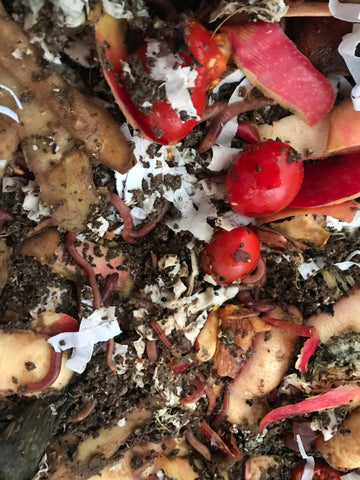Worms have an important place in every ecosystem and worm composting (vermiculture) is an awesome way of diverting food waste away from landfill. Worm composting, also known as vermiculture, produces natural, odourless compost and a rich liquid fertiliser with a very small investment of time and money.

Worm compost is a high nutrient fertiliser which can be mixed with potting mix or sprinkled on the surface around plants. Vermiculture is even used by large commercial dairy farms to process manure.

The Worm Cafe set up in an urban garden
How do worms make compost?
Worms simply eat your food scraps, converting them to compost as they pass through the worm’s body before excreting them as worm castings. Worms do not have teeth, so they will digest scraps which are chopped up small most easily.
Why choose a worm farm?
A worm farm is a clean, low pest way of making compost in an urban garden. Purchasing a worm farm is inexpensive, or you can make one yourself from up cycled materials such as a bathtub or an old fridge.
What foods can I put in my worm farm?
Worms love raw fruit and vegetable scraps. Since they don't have teeth, they will eat softer foods more quickly. Some people blend their fruit and vegetable scraps to a pulp before feeding to their worms.

What foods should I avoid adding to my worm farm?
Citrus fruits
Onions
Meats, oils and dairy products
Cooked foods
What other types of waste can I put in my worm farm?
Lint
Shredded paper
Cardboard
Vacuum dust
Pet/human hair
Coir
Leaves
Straw
Egg cartons
Coffee grounds
Grass cuttings
Egg shells
How wet/dry should my worm farm be?
Coir or shredded paper should be added to your worm farm as bedding. This material should feel like a wrung out sponge. In cooler weather the moisture from the food scraps will probably be enough to keep the worms happy. If its too dry, add a little water but be careful not to over-wet. In hot weather your worm farm may dry out around the edges - a quick sprinkle with the hose will fix this.
Where should I put my worm farm?
In Perth’s temperate climate, a worm farm should be positioned in a sheltered, shady location, especially in Summer. Under a veranda or carport is great, or search for some deep shade under a big tree to keep your worms healthy and cool. On extremely hot days (40C+) your worms will appreciate the addition of an ice block to stay cool. Make your own ice blocks by freezing a water bottle or two to use for your worms.
A worm blanket can be used to keep the temperature of your worm farm more stable and create the dark, moist environment that worms thrive in.
How often should I feed my worms?
Feed your worms a couple of times a week. Make a small hole and bury the food, before adding some fresh bedding on top. Shredded paper can be used for worm bedding or you can buy worm farm bedding which is made of coir (coconut) fibre.
Should I cut up or process the food for my worms?
Worms do not have teeth so it takes them longer to process large chunks of food waste. Cut waste into smaller pieces or even place it in a food processor before feeding.
What is the difference between worm tubes and worm farms?
Worm tubes are a type of in ground worm farm which nourish the soil around them as the worms compost the food. They can be moved around the garden to improve the soil in different areas. Worm tubes offer some advantages in Summer as the worms can burrow deeper into the soil to escape hot temperatures.
Above ground worm farmsproduce worm compost or worm castings which are contained within the farm and need to be harvested or separated from the worms. Worm farms also produce leachate which can be made into a liquid fertiliser or worm tea.
Do you have any questions about setting up your worm farm? Contact us or visit our Perth Eco and Garden Store for free worm farming advice. We also host regular composting workshops which cover worm farming with a chance to ask questions and seek more advice.
What type of worm farm do you have?







Leave a comment (all fields required)